Dr. Hawryluk has treated thousands of dental emergencies, and we aim to give you prompt pain relief.
St. Lawrence Dentistry is open six days a week (except for a few long weekend holidays). Also, we have an answering service to take your emergency calls should you need to reach us during non-business hours. Dr. Hawryluk has ample experience in emergency dentistry. He has dealt with many dental sports injuries and was the team dentist for the Toronto Marlies hockey team. St Lawrence Dentistry is well-seasoned in treating dental emergencies and has ample experience reconstructing dentition after dental trauma.
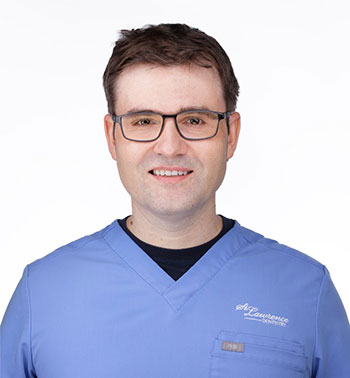
A dental emergency can take many forms. It can be related to swelling or pain in your mouth. Sometimes, there can be an “esthetic dental emergency” such as when a front tooth fracture occurs before you have an essential event to attend. Similar to medical emergencies, dental emergencies must be diagnosed and treated promptly by the appropriate clinician before any condition worsens. Other examples of Dental Emergencies are severe toothaches, fractured teeth, knocked-out teeth, lodged foreign bodies in teeth, and severe gum injuries.
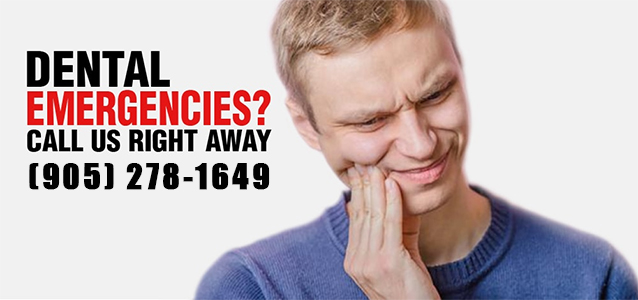
A “toothache” can be related to dental Decay, reaching the dental nerve of the tooth. When this happens, the tooth can start to hurt, and sometimes the pain can be overwhelming. If this is the case and you live in Mississauga, it is best to contact St. Lawrence Dentistry as soon as possible. A toothache is often related to a dental abscess, essentially bacteria around a tooth. Sometimes, the bacteria can rapidly expand, resulting in a dental and medical emergency. Dr. Hawryluk will carefully assess the cause of your toothache and remedy the tooth pain you are having. Ideally, do not take “pain” medication right before seeing the dentist, as it can obfuscate a diagnosis. Sometimes, you can temporarily reduce dental pain by rinsing your mouth with warm water. If you’re experiencing inflammation, apply a cold compress to the outside of the mouth or the cheek near the inflamed area. Never try to use a painkiller or aspirin directly over the affected area because the chemicals may burn the tissue and make matters worse.
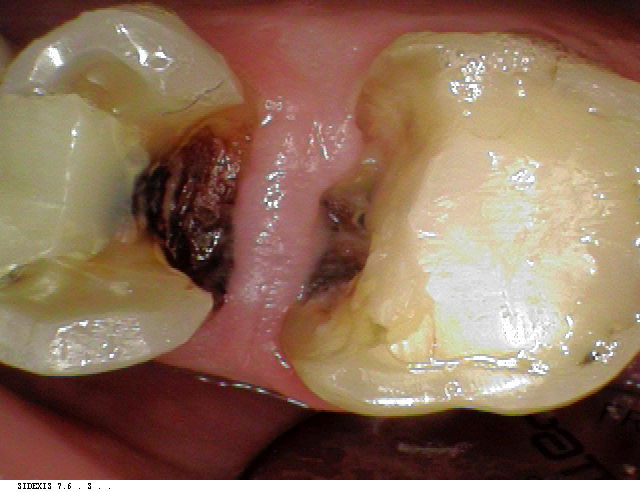
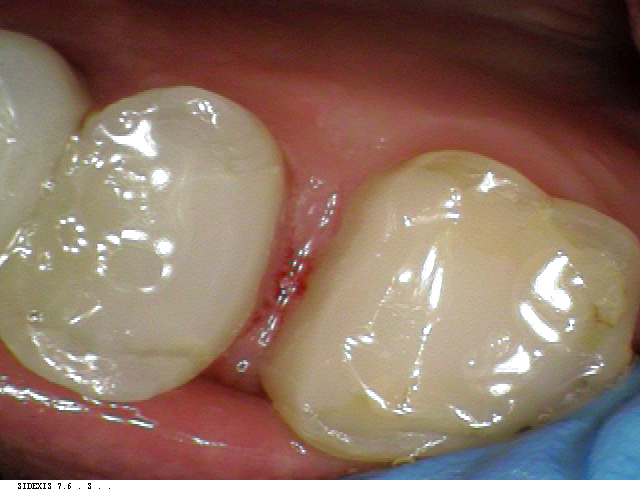
One less typical dental emergency is an ‘avulsed tooth’ when a tooth is completely “avulsed tooth” of the tooth socket. Unlike chipped or broken teeth, Dr. Hawryluk can sometimes push a “knocked out” tooth can place back into its socket. If you knock out a tooth, putting it on a tissue growth substance such as milk, water with a small amount of salt, or a save-a-tooth container is advisable. If you are rinsing your mouth after your tooth has been avulsed, put a cloth over the drain so your tooth does not go down it. Successful tooth re-implantation is sometimes possible for patients who can contact their dentists within one hour after the trauma. If the knocked-out piece still has some tissue attached, don’t try to remove it; leave it as it is and take it to the dentist. To avoid inflammation, you should apply a cold compress to the outside of the mouth or cheek.
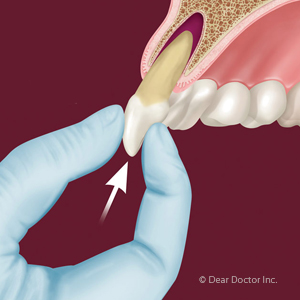
A lodged foreign bodies are a typical dental emergency. The most common occurrence is when a popcorn seed gets trapped below your gum line. Most of the time, this happens in someone with bone loss around molar teeth, and there is ample space below the gum for the object to sit. It is incredible how a tiny particle can cause significant inflammation in your gums. If gentle flossing cannot rid your gums of the debris, it is best to stop flossing and have your dentist examine the area. Sometimes, flossing can push the debris further into the mouth gum.
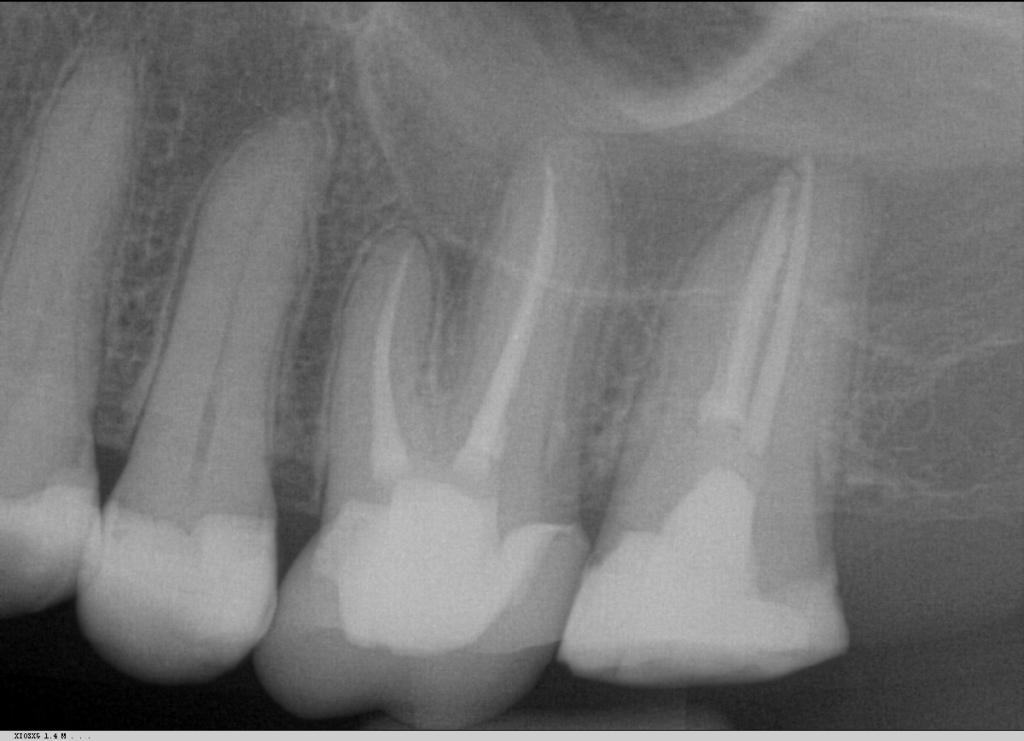
Fractured teeth are both an esthetic and dental emergency. Sometimes, Dr. Hawryluk can fix a fracture by dental bonding. Bonding is the best-case scenario for fractured teeth because this treatment is very conservative and often does not involve drilling on the tooth. However, the fracture can sometimes be so deep that the tooth nerve is exposed. In these cases, the dentist may have to do an additional procedure, such as a direct pulp cap or root canal treatment. Finally, a dental crown is sometimes needed to protect the tooth if a fracture is large. The dental crown is the most durable and definitive type of dental restoration.
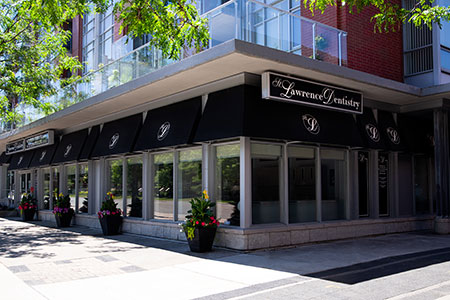
Well-trained dentists are best for handling mouth emergencies. However, you may need medical attention at your nearest hospital if you cannot reach a dentist. Situations where you may need to go to the emergency room or the hospital are severe pain, swelling, which is increasing rapidly, trouble breathing or swallowing, and feeling febrile. The nearest hospital to St. Lawrence Dentistry is Trillium Hospital on Queensway. The medical team at the hospital will consult with the dentists/oral surgeons on staff if needed.
In addition to being open on weekdays, we are open on Saturdays for your convenience. St. Lawrence Dentistry is ready to help with your dental emergency promptly and professionally. If you need an emergency dentist in Mississauga, please call us.



